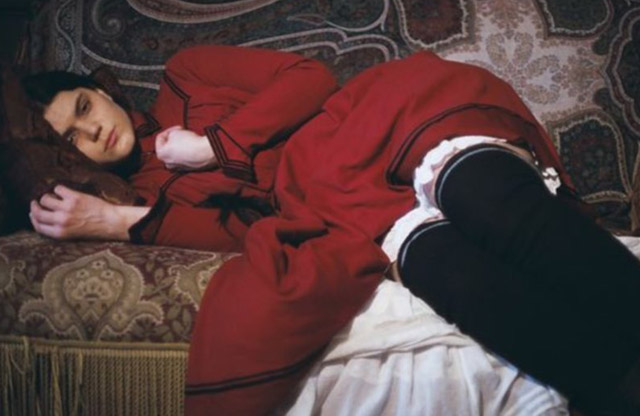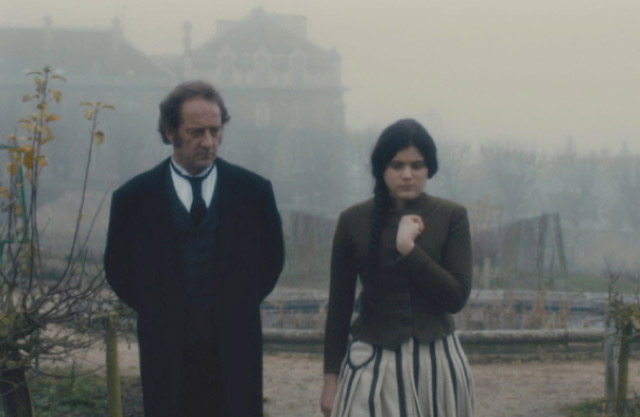CHICAGO – Patrick McDonald of HollywoodChicago.com appears on “The Morning Mess” with Dan Baker on WBGR-FM (Monroe, Wisconsin) on March 21st, 2024, reviewing the new streaming series “Manhunt” – based on the bestseller by James L. Swanson – currently streaming on Apple TV+.
Nature’s Instincts on Display in Unique ‘Augustine’
 Rating: 4.0/5.0 |
CHICAGO – How the human species was able to survive, given its dismissal and treatment of women during certain points in history is somewhat miraculous. This film from France, “Augustine,” chronicles the relationship between a 19th century neurologist and his prized female patient, as she tries to work through a condition called nature.
What looks like an epileptic seizure on the surface is actually a condition called “Hysteria,” the repressed female sexual release that emerges like a spasm. This was used for comedic purposes in last year’s appropriately titled “Hysteria,” but in this rendering – written and directed by Alice Winocour – it is dead serious. The doctor brought to life in the film, Jean-Martin Charcot, was real, the “founder of modern neurology.” He theorized that Hysteria was a neurological condition, and the narrative in the film proves him wrong, as the biological imperative of sexuality plays an interesting and vital role. The result is absorbing, and is a reminder of the ignorance in the animal side of our humanity.
Augustine (the French actress singularly named Soko) is a lower class chambermaid in 19th century France. During a dinner party service, she suffers what looks like a grand mal seizure, the result of which permanently closes her right eye. The house takes pity on her, and she is checked into a woman’s mental hospital, under the auspice of Dr. Jean Martin-Charcot (Vincent Lindon).
 Photo credit: Music Box Films |
The good doctor focuses on Augustine’s unique case, which involves hypnosis to bring her to the point of Hysteria (the aforementioned repression of female orgasm). Augustine becomes somewhat of a circus act for Dr. Charcot, as he puts her on display before several rounds of colleagues. Despite this chicanery, Augustine becomes enamored of Charcot, and their relationship escalates into a connection neither of them expected.
This is based on fact, as Charcot was the conduit to the modern science of the brain. But as the story highlights, even his brilliance in the field could not distinguish between natural sexual law and the mind of Augustine. It becomes obvious that Augustine’s “seizures” have another origin, and her paralysis is based on her body sending signals for her emerging womanhood. This is crazy, in the sense that attitudes like this were once real. But if you think people can be conservative now, imagine what ignorance existed for a dismissed, lower class chambermaid. With her social station, the fact that Augustine becomes a prototype for study is as remarkable as any cure.
The performances of the doctor and his patient, and their relationship, are measured and evolved. There is a poignant scene in which the both of them are interacting with the doctor’s pet monkey. The easily symbolic circumstance between man and monkey is well played, and creates a spark that frightens both of them, but especially the doctor. It’s a set-up for an ending that is within the see-it-to-believe-it realm, but is thematically perfect.
The French actress Soko expressly embodies the poor soul of Angeline, lost within her class standing, but lucky enough to find some semblance of hope for an unexplained bodily mystery. The character instinctively begins to understand what is really happening to her, and the actress subtly shifts the machinations of both her physical and mental state. This is a role that requires no filter, obviously, and Soko is able to be naked physically, morally and psychologically. Every actor should ask themselves if they would be willing to go as far.
 Photo credit: Music Box Films |
This is a one note story, however, once the premise is established there are spots of slowness before the big “climax.” But it fascinates to the extent that this “dark age” was only 150 years ago. It becomes an obvious lesson that no matter how society and culture might deny that some subjects should never be talked about, information and openness has certainly helped the status of the female gender evolve much quicker just by providing correct information about the “facts of life.”
Want something different in your cinema trip? Indulge in “Angeline” and discuss it afterward, with any number of movie going companions. This is strange and kind of wondrous treatise, in congress with who and what we really are. Having met Angeline, she – and the relationship with the doctor – becomes a reflection of us.
 | By PATRICK McDONALD |


